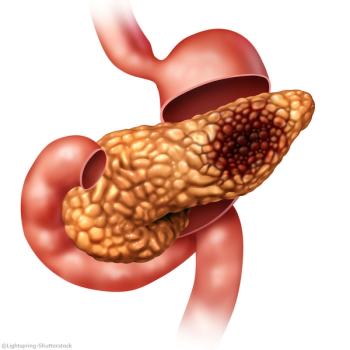
Oncology NEWS International
- Oncology NEWS International Vol 6 No 6
- Volume 6
- Issue 6
Hereditary Pancreatic Cancer: Part I. The Genetic Profile
Adenocarcinoma of the pancreas is the fifth leading cause of cancer death in the United States.[1] It has a lifetime incidence of approximately one in 150 persons in the United States and a male-to-female ratio of approximately 1.3 to 1.[2]
Adenocarcinoma of the pancreas isthe fifth leading cause of cancer death in the United States.[1] It hasa lifetime incidence of approximately one in 150 persons in the UnitedStates and a male-to-female ratio of approximately 1.3 to 1.[2]
Most patients present with advanced inoperable disease, and the overallsurvival is less than 5% at five years.[3] However, for patients presentingearly, without clinical evidence of metastasis, pancreaticoduodenectomycan result in a five-year survival of approximately 25%.[4]
Techniques to detect early cancer in at-risk patients, before they developinoperable disease, could save many lives. Pancreatic cancer has a significant,although generally under-recognized, hereditary predisposition, and patientswith this hereditary predisposition constitute an at-risk population towhich screening techniques could be applied.
For many hereditary cancers, such as familial polyposis coli, hereditarynonpolyposis colon cancer (HNPCC), or familial breast cancer, a familialtendency toward cancer development can often be easily identified on thebasis of a pattern of autosomal dominant inheritance with high penetrance.
In contrast, even for patients with pancreatic cancer in whom a hereditarypredisposition has been identified, clinical features alone often failto raise suspicion of hereditary cancer. Despite these difficulties, severalgenes responsible for at least part of this hereditary predisposition haverecently been identified.
Once the genes responsible for an inherited predisposition are characterized,they can be used to identify and manage gene carriers. Indeed, commercialtesting for hereditary-cancer-predisposing genes is becoming increasinglyavailable. However, until technologic advances enable routine genetic testingof virtually all cancer patients, the most important task for the clinicianconsidering cancer patients for genetic testing will remain the identificationof those patients who carry a hereditary predisposition.
The molecular genetic profile of pancreatic cancer has been relativelywell characterized, compared with that of some other cancers. Infiltratingadenocar-cinoma of the pancreas has a unique genetic profile, with somaticmutations of the K-ras gene (more than 90% of tumors)[5,6] and the p53gene (50% to 75%),[7] and genetic inactivation of the p16 gene (approximately80%)[8] and the DPC4 (SMAD-4) gene (50%).[9]
Unlike colorectal cancers, pancreatic cancers do not have APC mutations.[10,11]Similarly, microsatellite instability suggestive of an inherited defectin one of the mismatch repair genes is an unusual finding in pancreaticcancer.[12]
The genes mutated in sporadic cancers are frequently also responsiblefor hereditary cancers. Thus, this understanding of the molecular geneticsof infiltrating pancreatic cancer provides a foundation for examining themolecular basis for hereditary pancreatic cancer, which will be reviewedin the
References:
1. Wingo PA, Tong T, Bolden S: Cancer statistics, 1995. CA Cancer JClin 43:7-26, 1995.
2. Devesa SS, Blot WJ, Stone BJ, et al: Recent cancer trends in theUnited States. J Natl Cancer Inst 87:175-182, 1995.
3. Carriaga MT, Henson DE: Liver, gallbladder, extrahepatic bile ducts,and pancreas. Cancer 75:171-190, 1995.
4. Yeo CJ, Cameron JL, Lillemoe KD, et al: Pancreaticoduodenectomy forcancer of the head of the pancreas. Ann Surg 221:721-733, 1995.
5. Hruban RH, van Mansfeld ADM, Offerhaus GJ, et al: K-ras oncogeneactivation in adenocarcinoma of the human pancreas: A study of 82 carcinomasusing a combination of mutant-enriched polymerase chain reaction analysisand allele-specific oligonucleotide hybridization. Am J Pathol 143:545-554,1993.
6. Almoguerra C, Shibata D, Forrester K, et al: Most human carcinomasof the exocrine pancreas contain mutant c-K-ras genes. Cell 53:549-554,1988.
7. Redston MS, Caldas C, Seymour AB, et al: p53 mutations in pancreaticcarcinoma and evidence of common involvement of homocopolymer tracts inDNA microdeletions. Cancer Res 54:3025-3033, 1994.
8. Caldas C, Hahn SA, da Costa L, et al: Frequent somatic mutationsand homozygous deletions of the p16 (MTSI) gene in pancreatic adenocarcinoma.Nat Genet 8:27-32, 1994.
9. Hahn SA, Hoque ATMS, Schutte M, et al: DPC4, a candidate tumor suppressorgene at human chromosome 18q2l.1. Science 271:350-353, 1996.
10. Seymour AB, Hruban RH, Redston MS, et al: Allelotype of pancreaticadenocarcinoma. Cancer Res 54:2761-2764, 1994.
11. McKie AB, Filipe MI, Lemoine NR: Abnormalities affecting the APCand MCC tumour suppressor gene loci in chromosome 5q occur frequently ingastric cancer but not in pancreatic cancer. Int J Cancer 55:598-603, 1993.
12. Hahn SA, Seymour AB, Hoque ATMS, et al: Allelotype of pancreaticadenocarcinoma using xenograft enrichment. Cancer Res 55:4670-4675, 1995.
Articles in this issue
over 28 years ago
Studies of Counselings' Impact on Survival Challengedover 28 years ago
Telomerase Activity Potential Marker for Bladder Cancerover 28 years ago
Writing Genetic Testing Guidelines Complex Endeavorover 28 years ago
AACR Meeting Sees Growth Spurt in Telomerase Researchover 28 years ago
DDT Appears to Activate Human Estrogen Receptorsover 28 years ago
Studies Highlight Role of bcl-2 Gene in Programmed Cell Deathover 28 years ago
Efficacy of BCG Maintenance in Bladder Cancer Is Confirmedover 28 years ago
Surgery Seen as Adjunct to Chemo in Some Invasive Breast Cancersover 28 years ago
Traveling Exhibit of Cancer Educational ResourcesNewsletter
Stay up to date on recent advances in the multidisciplinary approach to cancer.






































